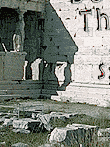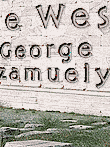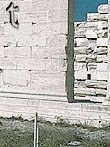The
United States and the European Union poured hundreds of
millions of dollars into Yugoslavia over the years trying
to oust Slobodan Milosevic. They ended up with no popular,
national hero in the Lech Walesa or Vaclav Havel mould;
rather a not terribly bright, pedantic protégé,
one who can only achieve power by thuggery, media attention,
and large infusions of foreign cash. As ever, the NATO project
is failing. Since last week throughout the country drunken
mobs have been storming the offices of factories, coalmines,
banks and universities and forcing people to resign. Armed
gangs seized the National Bank as well as the Customs’ office.
The managers of Yugoslavia’s largest gold mine and smelter
were kicked out, as were the managers at Zastava, the country’s
giant carmaker. The Director of the Kolubara coalmining
complex was thrown out, as was the Director of Yugoslav
Coal Production.
This
lawlessness has not escaped the attention of the Yugoslav
military. Last Sunday Kostunica met the Yugoslav Army General
Staff. At the meeting, according to the Serbian Ministry
of Information, "concern was expressed over certain
events in the country, in post-election period, that are
not in accordance with the Constitution and the laws, and
the position and role of the Yugoslav Army in resolving
problems had also been considered." Sounds like a clear
warning to Kostunica not to engage in mob rule. Zoran Djindjic,
unquestionably the real leader of the Democratic Opposition,
evidently decided that the time had come to try to use the
same bullying tactics with the army. Djindjic began telling
reporters about the need to replace Army Chief of Staff
General Nebojsa Pavkovic with Momcilo Perisic, a former
general sacked by Milosevic in 1998. "We can expect
not only the resignation of the present chief of general
staff Nebojsa Pavkovic, but also a wind of fresh air throughout
the top ranks," Djindjic said. On Wednesday Kostunica
went to army headquarters – a highly revealing act
leaving no one in any doubt as to who really wields power
in Yugoslavia. Following the meeting, the army issued an
ominous statement: "The army leadership drew the President’s
attention to possible negative consequences which might
result from increasingly violent attacks on and efforts
to discredit individual Army officers and the Army as an
institution of vital importance to national security and
defense." Kostunica made it clear that Pavkovic was
staying on, that he had never had the slightest intention
of replacing him and that Djindjic does not speak for him.
Like Al Gore, Kostunica is "his own man."
On
Monday, the Democratic Opposition was boasting that it had
bullied the Serbian President Milan Milutinovic into holding
elections for the Serbian Parliament in December and into
ceding power to a transitional Government in the interim.
Now, it looks as if there will be no elections until September
of next year, when Parliament’s term is due to end. Members
of Milosevic’s Socialist Party and those of Vojislav Seselj’s
Radical Party walked out of talks earlier this week on forming
a new government in Serbia. They vowed not to come back
until the "end of riots, violence and lawlessness against
the citizens of Serbia." The Radicals complained of
people were being "lynched by mobs belonging to the
illegal regime of the Democratic Opposition."
The
response of the Democratic Opposition was to threaten more
violence. Djindjic issued an ultimatum. Either the Serbian
Government sets a date for new elections by Friday or the
Opposition will call its followers out into the streets.
One senior Democratic Opposition official, Cedomir Jovanovic,
warned the Socialists, that they will face "non-constitutional"
pressure. Jovanovic said that the DOS would ask for the
help of people in the streets to force the Serbian Government
into holding early elections and to cede power to a "transitional
government." The "people’s patience is exhausted,"
said Velimir Ilic, the Mayor of Cacak. "Serbs are so
eager to see changes, and I do not know who…will protect
Socialists if they continue to drag their feet."
Meanwhile,
the Democratic Opposition is trying to bring the Serbian
police under its control. Serbia’s Interior Minister resigned
this week citing a conflict of interest on account of having
been elected to the Federal Parliament. The media reported
this as a major triumph for Kostunica. No sooner had they
done so, than Serbian Prime Minister Mirko Marjanovic announced
that he was taking over the Interior Ministry himself and
thereby assuming control of the police.
Kostunica
wants to ignore elected bodies and to set up so-called "crisis
committees" to run the country. But no one is buying
into the idea. According to Branislav Ivkovic, a senior
figure in Milosevic’s Party, the "government [of Serbia]
will…ignore all the decisions of the so-called ‘crisis committees’."
In addition, all managers of state companies dismissed by
the Democratic Opposition will be reinstated. The Serbian
Government, he explains, "was elected on a four-year
mandate, and it is the only one which can make legal decisions."
This
week Zoran Djindjic announced that the new Federal Prime
Minister would be G17 Plus Chief Executive Miroljub Labus.
Djindjic has long been an advocate of putting Yugoslavia
into the receivership of the IMF. G17 Plus drew up the Democratic
Opposition’s economic program, with all its promises to
abide by IMF demands. Apparently this was all news to Kostunica.
He announced that he had promised the job of Prime Minister
to a member of Montenegro’s Socialist People’s Party, which
is aligned with Milosevic. The Socialist People’s Party
has, however, rejected the notion of establishing a "government
of experts" in the interim. Kostunica intends to travel
to Montenegro on Friday to meet local party leaders as well
as Milo Djukanovic. Note that once again it is Kostunica
who has to do the traveling and the paying of respects,
not the politicians of Montenegro.
Kostunica
continues on his clueless and sycophantic way. "The
United States has done too much meddling in our internal
affairs," he says in the Times interview as
if he were still running for office, "Now it’s meddling
less than usual, so this will have a positive influence."
"Less than usual"? The United States manipulated
an election, and engineered his seizure of power. What does
he mean by "usual"? On improving relations with
the United States, the Times says: "If re-establishing
diplomatic relations is in his competence as Federal President,
he said, he will do it quickly." An extraordinary statement,
first, in its revelation about Kostunica’s lack of knowledge
as to what falls within his competence. Second, in its revelation
as to the kind of "nationalism" espoused by this
supposed "Serbian nationalist." He literally pants
to win the approval of the very power that was bombing his
country to smithereens last year. Third, if even diplomatic
relations do not fall within his competence, what does?
What
happened in Yugoslavia was the overthrow of a legitimate
Government by a combination of brute force and US threats
and dollars. The people who have been hoisted into power
are no democrats, but the servants of foreign interests.
They have no power, and their attempts at circumventing
democratic institutions are meeting ferocious resistance
in the country. The media hacks, robbed of their "fall
of the Berlin Wall" and "people power" story
are unable to understand any of this. Convinced that the
Democratic Opposition leaders are the "good guys,"
and that the United States is self-evidently on the side
of democracy and freedom, they have only one explanation
as to why events are not following the approved script:
the old standby, "Milosevic is causing mischief."
But this is an old story now, and an increasingly unconvincing
one. By stepping down last week and not resorting to violence,
Milosevic may well have outmaneuvered the Americans once
again. The fight for Yugoslav sovereignty will continue.










